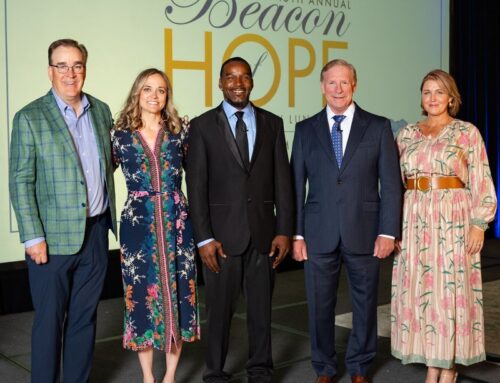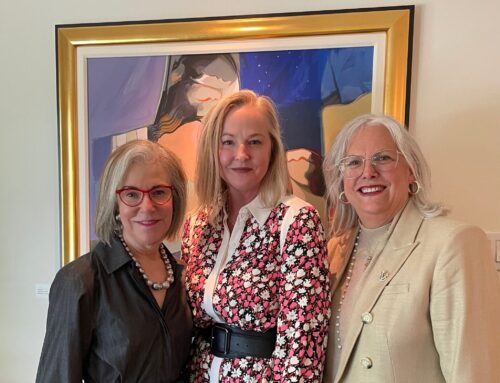
Photography by Yuvie Styles.
Clarisa Lindenmeyer was doing consulting on the side while working at Tech Wildcatters, a seed-to-Series-A venture capital fund. Her husband, Matt, suggested she make her work official through an LLC. They needed a name for the business, even though they didn’t expect it to be a public-facing company. Lindenmeyer remembered a concept she heard about while getting an MBA at The University of Texas at Dallas: proximity to power. It’s the idea that simply working near leaders of an organization can provide valuable access and leverage. The LLC, Proximity to Power, was formed.
When she was seven months pregnant, Lindenmeyer was unexpectedly laid off at Tech Wildcatters. A reporter asked what was next. Consulting, she responded, and the reporter wondered what the name of her consultancy was. That’s when Proximity to Power became a public-facing company.
Lindenmeyer, who lives with her husband and three children here in the neighborhood, has closed down the consultancy. In June, she joined financial technology payroll platform Gig Wage as the chief brand officer and chief of staff to the CEO.
How did you break through the glass ceiling?
It was probably when I left my role as the director of sales and marketing at TELOS fitness center. I certainly wasn’t being paid what I deserved. And I had gotten my MBA, and I was ready for more. And that’s when I got asked to work at Tech Wildcatters from a friend and colleague, somebody I grew up with. And it was the first time I said, “This is what I need to make this work. This is how much I should make. And I’m worth it. And by the way, I wanted to have Mondays and Fridays at home, to be with my kids. And I need you to let me design my life. I’ll give you my all as a professional, but I need to be able to make this work around our home and the other aspects of my life.” And she was all for it. I think that was the moment that I really just leaned into asking and demanding what I was worth.
What advice do you have for women or minorities entering male- or white-dominated industries?
My advice would really be the same advice I would give anyone that was breaking into any industry or trying to get noticed. It goes without saying: do excellent work. The work always has to be there. I look at the team I lead today. We have some amazing high performers. And they work hard. They ask great questions. They ’re not afraid to make mistakes. They’re not afraid to push. And so I think those things have to be there. But I think you have to advocate for yourself. And I think you have to be willing to beat your own chest. And then the other thing I would say is building out your network.
What attracted you to Gig Wage and your position as chief of staff?
I had the benefit and luxury of knowing both the founder and the company for a really long time, so I was comfortable with what the company was doing. I had intimate knowledge of how much opportunity lies within not only the organization, but the space that they are working in, this gig economy, the 1099 workforce. And obviously, I had already kind of embodied that spirit. And so it was inspiring to me to be able to work for an organization that had so much potential but also was doing something so meaningful. My choice and decision to join as chief of staff was really because I got to really step into the role I think I was literally made for: to walk alongside a visionary founder and executive and be an extension of that brain and office.
How do you define effective brand development?
A lot of times, brand is a little bit more nuanced. How do we define or measure what someone feels when they interact with us? Yet, we all know it when it’s done well. That’s something we talk about quite frequently. When you see something right away, you identify it with an organization or a product, like your brain doesn’t have to do any work. But you start to see, if you have a well-defined brand, you really start to see the layering of that marketing and sales, interacting with it, the kind of impact and overall growth or the organization.
It seems like consumers are becoming more conscious about supporting minority- or women-owned businesses. How does that affect your job?
Every company in one way or the other is being forced to recognize that the spotlight is on you. What does your board look like? What does your C-suite look like? How much of your new company is comprised by people of color or women? So there’s a lot of checking the box out there. There just is. But with Gig Wage, our CEO is a Black founder of a tech company, extremely unique. We’re so authentically committed to creating a diverse workforce, because it’s the best thing for business and our community. But it doesn’t feel like something I have to think about or plan about, even though we are extremely intentional.
Do you worry about cancel culture?
This concept of cancel culture is really on my mind a lot for a lot of reasons, not just professional, but personal as well. I actually haven’t run smack dab into it. However, I look back at some of the things that I have seen and witnessed in different parts of my career, and realize how drastically different things are right now in the sense that there would just be so much more accountability and visibility and light shone on a particular moment. But that doesn’t mean we aren’t extremely cognizant of what we do and say, and I don’t think that’s just because of cancel culture. I think it’s because it is necessary. It is really important to be judicious and intentional with the messages that you put out into the universe. You can’t be a business and not be thinking about it. Whether you agree with it or not, you have to be aware of the things that are affecting consumerism to be good at your job.
What ’s something you wish you would have known earlier in your career?
I would have taken building my Rolodex, the currency of building a network, much more seriously and strategically, earlier on. Now, I built a great one. But it kind of happened by happenstance. I got really fortunate right where I worked. I had a lot of access to a lot of important and powerful people. But when I mentor people today, I always tell them that. Be strategic and tenacious about building out your network. And then I think I would have gotten involved in giving back to the community a little bit earlier. It’s really necessary to get involved with nonprofit causes. But it’s also really good for your career. Both are true. So I would tell younger people to get involved in the young professional organizations. Get aligned with causes that are important to your heart and help because our community desperately needs it.









